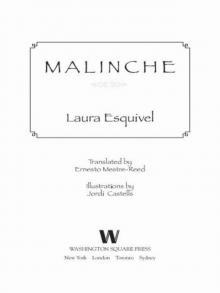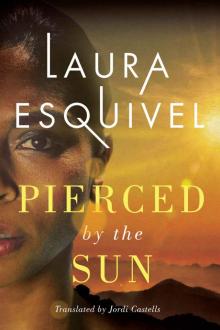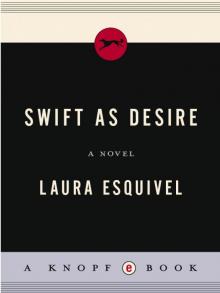- Home
- Laura Esquivel
Malinche Page 13
Malinche Read online
Page 13
When Malinalli became pregnant she felt complete, happy. She knew that in her womb there was beating the heart of a being that would unite two worlds. The blood of Moors and Christians with that of the Indians, that pure, unmixed race.
During her pregnancy, when she did not know whether she would have a boy or a girl, she wove blankets from malinalli fiber in a loom. Malinalli braided malinalli. The “Braided Grass” prepared the warp of her fabric, weaving the grass. She was going to dress her child with all her being. he was going to cover it like the shell that covers the seed in order to reverse the process taking place in her womb. Malinalli knew that just as every plant fulfilled the cycle of being sown, sprouting, flowering, and death, always going from darkness toward the light, likewise within her a seed was germinating that would come out into the light. The seed of a plant, in order to germinate, had to cast off the shell that was covering it. She wondered if that was why priests who sacrificed prisoners flayed them and then wore their skin. The seed loses everything to gain everything. It loses its shell to become a plant, which is in turn everything, earth, water, sun, and wind. But when her child came out of the womb, she wanted to continue to cover it and that is why she made blankets of malinalli .
When the boy was born, Cortés celebrated for three days. It was his firstborn, a male child. Now he had an heir, someone to perpetuate his name. But a black thought tarnished his joy, that his son was a son born outside of wedlock, and moreover, from a slave. His son would not be well looked upon in the court of Spain. His son was a mestizo. To complicate matters, his wife, Catalina Xuárez, had arrived in Mexico. From the very first day, she made great effort to ruin whatever satisfaction remained in Cortés.
Catalina had not been able to give him children and was terribly jealous of Malinalli and her child. Cortés, attempting to please her, organized a welcoming party. During the feast, Catalina pursued Cortés everywhere, not to enjoy his company, but to argue. The quarrel grew so loud that most of the guests decided to leave early. Cortés and Catalina continued arguing in their bedroom.
The day after, while Malinalli nursed her son, she was told by one of the servants that Catalina had been found dead that morning. A servant woman had found her in bed, dressed in the same clothes that she had worn to the party. There were bruises on her neck. Her pearl necklace had been torn off and the bed urinated on. The rumor of a possible murder spread all over.
One of the things that most affected Malinalli was that the necklace had been torn off. Someone had disconnected Catalina from the necklace of creation.
The starry infinite night watched over Cortés and Malinalli. hey were sitting around a bonfire, surrounded by soldiers who ate in silence. In the field, there were various fires that were reflected in the stars. Malinalli watched Cortés, who was looking all around, now at the sky, now at the fire, now at the ground. From the day that she had watched him cleaning his weapons and sharpening his sword, she knew that an obsidian wind was threatening her. She knew perfectly well how he was the father of her son, how his blood had been re-created in her entrails. She thought that she had always known him; he was so familiar, so near, that she accepted him as part of her destiny, as if he had been born from her own womb, as if he had been born to listen to her tongue, as if he had been born to injure her heart. On noticing Cortés’s restless gazing, she easily discovered in it a permanent dissatisfaction, a constant disappointment, as if the only thing that could bring him satisfaction and pleasure was the act of conquering. Not the goals achieved. Not the victories. Not the infinite power he possessed.
“This man is insatiable,” she told herself. “It seems that the only thing that awakens him to life is death. The only thing that gives him joy is blood, the urge to destroy, to break apart, to tear, to transform.”
She felt pity for him and for the first time had compassion for this obsessive and terrible man. She felt it a shame that he could not be at peace. They were on the way to Hibueras, with plans of conquest, and Malinalli was afraid that if he was successful his desire for conquest would grow and he would go mad wanting more and more. She imagined that there would never be any rest.
“What a dreadful punishment!” she thought. “For this man is the father of my child.”
On their way to Hibueras, they passed by the place where Malinalli was born. To walk again on the ground where she had played so often with her grandmother, where she had known the unconditional love that she offered, was a strange experience. Everything seemed diminished, made smaller. What in the memories of her childhood was enormous, was there, but now she saw it in its proper dimensions.
She had contemplated this return many times, but had never made it. It was not until then, in the company of Cortés, that she retraced her past steps. Some distance before arriving, Malinalli’s heart was already uneasy, burning with its beating. The blood pulsed in her eyes and her look displayed the innocence of a girl and the endless hatred of one who for years had held on to a grief, who for years had kept a latent anxiety concealed deep in her heart, a forgotten ache that awoke hastily as Malinalli approached the place where she had been abandoned by her mother.
She could suddenly feel, in every pore of her body, all the grief of her infancy. “Destiny is exact and what is written in the stars is fulfilled,” were the words that Malinalli remembered at the moment that she saw her mother anew. There, standing before her, was that phantom that had loomed so frequently in her memory, but with a different appearance. There was the grandiose image of her mother, so strong and powerful, now appearing agonized, withered, worn out, and full of sorrow, wearing a mask of humility. By her side was Malinalli’s brother. She saw herself in the mirror of his gaze and recognized immediately the sensibility and inner world of a man who appeared to her as something long yearned for. He was so like her, so like her in face, in his heartbeat, in his breathing. It was as if she saw herself turned into a man. When he saw her, he immediately smiled. Malinalli’s heart beat with a deafening force. Her eyes were about to burst with tears. The feeling was similar to the first time she had fallen in love, the first time she had cared for someone. She wanted to kiss him, to embrace him, to caress him. But she was able to control herself, and returned his greeting with another smile. This world of perceptions of silent dialogues, of looks and gestures, was broken by Malinalli’s mother.
“My daughter, what a pleasure to see you!” she said, as she extended her hand to touch her, to caress her face. Malinalli eluded the contact.
“I am not your daughter nor do I consider you my mother,” she said. “You offered me no caress or loving word, no kind gesture or world of protection on that day when with such exact and punctual cruelty you gave me away. That day you decided that I would be a slave, you took away my heart’s freedom and my mind’s imagination.”
Malinalli’s mother could not hold it in anymore and her eyes spilled copious tears. Her dry lips pronounced words whose sound could move stones, and the most hardened hearts.
“My daughter, Malinalli, by the great expanse of the seas, by the power of the stars, by the rain that washes and renews all, forgive me. I was guided by desire, blinded by life, attracted to what breathed. I could no longer be married to death. Your father had died, was inert, no word came out of his mouth nor light from his eyes. I could not stay bound to his immobility. I was still a young woman and wanted to live, I wanted to feel. Forgive me, for I ignored the fact that your child’s heart could suffer. I thought that, being so young, you would have no memory of me, that you wouldn’t know that I had given you away. And I imagined that your grandmother would make you strong, that she would open your eyes, that she would look after your heart and your thoughts. I abandoned you to be myself. Forgive me.”
Malinalli was moved, her heart disturbed. She was about to embrace her mother and heal her wounds, but she held herself back. Her rancor, the pain of abandonment, was more powerful than her mother’s plea. Containing her emotions and in a display of cruelty, she responded with a coldness sharper than
ice.
“I don’t have anything to forgive you for. I can’t forgive that which made my fate better than yours. You gave me away, but fortune gave me power and riches. I am the woman of the foremost man, the woman of the man who is the new world. You stayed here in the old, in the dust, in what no longer exists. I, on the other hand, am the new city, the new beliefs, the new culture. I invented the world in which you are now standing. Don’t worry, in my codices you don’t exist. I erased you long ago.”
The mother pleaded again.
“The punishment that you grant me is small. I accept that my abandonment was more violent than your words, but, for the time that you and I were one life, for the time that inside my womb you were nourished, for the time that my eyes were your eyes and my hands your touch, I dare to beg of you to have mercy on us, not to do violence to our bodies, to spare our lives, to grant us life, lady of the new world.”
“Your fear surprises me. I see that you are unaware that to die is not to end, it is to continue, to evolve. Look at me! I survived the death that you had decided for me. It was you who invented all the punishments that you now suffer from. It was you who made the prison where you now live; but settle down, be calm, all rancor was expelled from me the moment that I saw you again. I have no wish to harm you. Be at peace. I will not hurt you, not you, nor my brother. I will forget everything and let my resentment be cast out into nothingness.”
With rage and with beauty, Malinalli tore her eyes away from her mother’s gaze and returned them again to her brother. Her face softened and her eyes, full of tenderness, kissed the face of her lost brother. She returned his smile with kindness and then continued on her way.
All paths change us. After a while of walking, Malinalli was able to undo the image of her mother that she had kept in her heart for years. With each step, the certainty of the abandonment faded little by little, and after a while Malinalli could feel love for her mother. When she was far from her she could love her and look upon her with different eyes.
She was ashamed of the disrespect, the arrogance, the disdain with which she had treated her progenitor. Now she felt tenderness. In her heart, she forgave her and at that moment remembered anxiously that she too had abandoned her son, that she had left him without her warmth, her breast, her lips, her gaze. She remembered the face of her son, barely a year old, grabbing her legs, begging her without words not to abandon him, begging her with smiles to stay near him. She remembered his cries when he was taken from her arms. She remembered what his life had felt like inside her and his lips on her nipples. The memories became one with the tears and she felt compassion for her mother. How had she dared accuse, when she too had been capable of abandoning!
She blamed herself for going against his wishes simply because she had wanted to stay by the side of that man who awoke in her the greatest of lusts: the longing for power, the desire to be different, unique, and special. She felt shame and a profound ache that ran through her spinal cord. The chill of suffering got inside her bones, became unbearable. She didn’t forgive herself, didn’t give herself the satisfaction, didn’t pity herself. From that moment on, the memory of her son would not leave her. The memory of the abandonment would be a nightmare in her mind, a hell in the palm of her hand, a mania in her look. She despised herself, and felt disdain in her heart and hatred, infinite hatred for Cortés. Disgust, emptiness, anxiety and bitterness, an uncontrollable urge to stone Cortés’s face, to destroy his image, burn his thoughts, undo him, bring him down, seeing him in pieces in the wind.
She went to meet him and told him to follow her, that she had something important to tell him. Cortés obeyed, convinced that she was going to tell him about some secret plan or some intrigue against him. He followed her in silence until they reached a high spot in a wood. From there, the infinitely green tropical jungles could be seen, and one could understand the beauty of all things. Cortés confronted Malinalli.
“We are here,” he said. “So now tell me, what is it that you want?”
“What I want, I can’t touch. It is far away from me. What I want is to feel the skin of our son. What I want is to fill his thoughts with beautiful words. What I want is to protect his dreams, to make him feel that the world is a safe place, that death will be far away from him, that he and I are one, that we are united by a force greater than our wills. What I want I can’t have because you drag me down the path of your obsessions. You promised me freedom and have not given it to me. Because of you, I don’t have a soul or a heart. I am a chattering object that you use without feeling for the sake of your conquests. I am the beast of burden of your desires, your whims, your madness. What I want is for you to stop your thoughts and for a moment realize that you are in the midst of life. And that those around you also breathe, blood also runs through our veins, and we feel loved or hurt; that we are not stone, or scraps of wood, or iron utensils. We are flesh, feeling, and thought. We are as you yourself say: verb incarnate, word in flesh. What I want is for you to awake and accept the opportunity I am offering you to be happy, to be a family, to be one being. I offer you the kisses of the stars, the embrace of the sun and the moon. Forget this absurd idea of going to conquer Hibueras, please, Hernán, banish such madness from your mind. Stop the interminable insanity in your heart and drink peace to quench your ambition and your delirium. That is want I want, and it is in your hands to give it to me.”
Cortés gave her a strange look. He was moved. No one had ever talked to him with so much truth, and yes, in reality that is what he too wanted in the profundity of his being, in the reality of his soul, but he couldn’t accept it. He could not reject the destiny of becoming the greatest of all men, the most powerful, the most immense, in exchange for a city and a woman already conquered. Because of this, he changed his mind right away and looked at Malinalli as if she were a mad and stupid woman who truly only served him as an object, as an instrument of conquest.
“Be reasonable, Marina,” he laughed and said. “Don’t let your feelings poison the meaning of our lives and accept that your mission is simply to be my ‘Tongue.’ Do not interrupt my thoughts again with your foolishness. And don’t think about repeating such stupid laments. Don’t waste my time. Dedicate yourself to obeying and be grateful for what I have done for you, because it is bigger than your life!”
After having said this, he moved away from her and toward camp, his irritation intense. Then, as if nature were confederate with Malinalli’s feelings, as if nature understood the justness of her words, the wind blew in a supernatural fashion, night fell instantly, the clouds covered the sun and the rain became indistinguishable from her tears.
That night Cortés got drunk. He drank to escape from himself, to flee from the words that Malinalli had pronounced hours before. To flee from the truth. He did not want to hear that a man is a transitory thing in this life, that no one remains forever on the earth, that power is fleeting, that time lays waste to all. Delirious, he sang and his off-key voice shattered the beauty of a song, or he recited verses in Latin, or pieces of poems that made no sense. The alcohol changed his behavior completely. Suddenly, his attitude changed. From raucous joy he went to anger, to violence.
“No one,” he screamed. “Listen to me! No one will ever betray me again. None of my men will be able to turn against me. No one will plan intrigues regarding my person, because whoever does, whoever dares, will die in an embarrassing and cruel manner. No one will be allowed to oppose my thoughts, my will. No one will be allowed to contradict my ideas, or ever to divert my intuitions. Those who are near me, who know me, have to be a shadow of my person, for only then will I be able to achieve all my goals, only then, can the infinite power of my emotions reach its joyful destiny. Everyone listen! Because if I die, so will you.”
At that instant, he kept his eyes on Malinalli, who was watching Cortés’s transformation and insanity. In those moments, he was truly frightening; he was someone who had lost control, was frenzied. It seemed as if his mind was set on fire with e
ach gulp of alcohol he drank. It ravaged his blood, and he became possessed by a desire for greatness and an unknown vengeance that seemed to come from some errant genes that forced him to transform the world into an arena of combat and death. That feeling of vengeance and anger was encrusted in Cortés’s heart and blood, as if his rancor caused a festering wound that affected all his thoughts.
Malinalli grew afraid and was overcome with a feeling of despair. Alcohol was a bad companion to men and to the gods. It had changed Quetzalcóatl in such a fashion that he had been capable of fornicating with his sister, and it was said that Cortés, under the influence of alcohol, had strangled his wife. This man was capable of the basest murder! A tragic omen coursed through her blood and warned her of her own danger, but at the same time offered her the serenity to feign calm in the heat of battle. Cortés pulled her toward him and said in a low voice:
“So you no longer want to be a slave, is that so? Then I will do as you please, I am going to make you into a wife, but not my wife. You are close to me, but we will not be united. Your blood and my blood created a new blood that belongs to both of us, but now, your blood will mix with someone else’s. I will continue to be your lord but you will never be my wife.”
Then an extraordinary scream came from Cortés’s throat.
“Jaramilooooooo! Come here, my faithful soldier.”
Jaramillo obeyed and when he was next to him, Cortés took his hand and placed it on Malinalli’s heart. Jaramillo, embarrassed, tried to pull it away, but Cortés held it firmly in place.
“Approach this woman,” he said. “Feel her heart, her touch, her hair, because from here on, she is yours. Take this woman to sate all your desires in her and to see if you can become me.” He laughed in an exaggerated and false manner.
Cortés chose Jaramillo to be with Malinalli because, aside from being one of his most valued men, he was the most trusted. He wanted to bind Malinalli to Jaramillo for two reasons: to bind Jaramillo to his will and to deal with Malinalli from a more reasonable distance, a less emotional one. In such a way he could make best use of that surprisingly intelligent woman who was indispensable to his plans.

 Like Water for Chocolate
Like Water for Chocolate Malinche
Malinche Pierced by the Sun
Pierced by the Sun Swift as Desire
Swift as Desire![[2013] Pierced by the Sun Read online](http://i1.bookreadfree.com/i2/04/10/2013_pierced_by_the_sun_preview.jpg) [2013] Pierced by the Sun
[2013] Pierced by the Sun